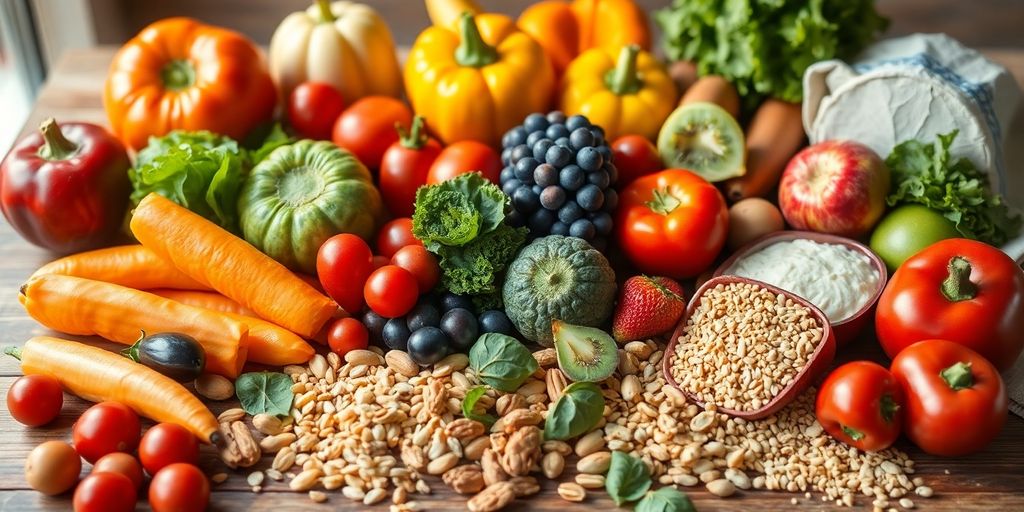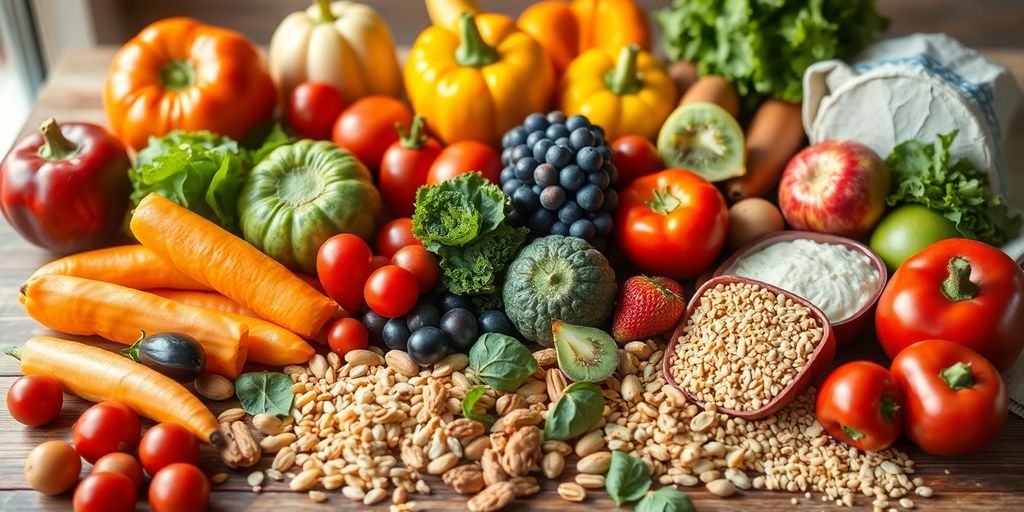Name Brand Vitamin Alternatives: Natural Supplements & Healthy Habits
When it comes to getting the vitamins and minerals our bodies need, there’s a lot of talk about supplements. But have you ever thought about what you can find right in your kitchen? This article is all about exploring name brand vitamin alternatives: natural supplements and healthy habits. We’ll look at how whole foods, probiotics, and mindful eating can help you stay healthy without relying on those pricey vitamin bottles.
Key Takeaways
- Whole foods like fruits, vegetables, and whole grains are packed with vitamins and minerals.
- Phytochemicals found in plants can improve health and lower disease risk.
- Fermented foods are a great source of probiotics that can boost gut health.
- Healthy cooking methods like steaming help keep nutrients intact.
- Adopting healthy habits like regular exercise and good sleep can enhance overall wellness.
Whole Foods As Vitamin Sources
Fruits and Vegetables
Okay, so we all know we should be eating more fruits and veggies, but it’s worth repeating. They’re not just good for you; they’re packed with vitamins and minerals your body actually recognizes and can use effectively. Think of it this way: a carrot isn’t just beta-carotene; it’s also fiber, water, and a bunch of other helpful compounds working together. It’s way more than just popping a vitamin A pill. I try to get a rainbow of colors in my diet every day. It’s a simple way to make sure I’m getting a variety of nutrients. For example, I love adding antioxidant-rich fruit to my breakfast.
Whole Grains
Don’t get me started on the whole
The Role of Phytochemicals
Phytochemicals are compounds produced by plants that may have health benefits when consumed. They aren’t vitamins or minerals, but they can still play a role in keeping you healthy. Let’s explore where to find them and what they do.
Understanding Phytochemicals
Phytochemicals are naturally occurring compounds in plants. They’re not essential for life, like vitamins, but they can influence your health. Think of them as bonus ingredients in your food. There are thousands of different phytochemicals, each with its own potential benefits. They often work as antioxidants, protecting your cells from damage.
Sources of Phytochemicals
Getting enough phytochemicals is usually as simple as eating a colorful diet. Here are some examples:
- Berries: Blueberries, raspberries, and strawberries are packed with flavonoids.
- Orange Vegetables: Carrots and sweet potatoes contain carotenoids.
- Tomatoes: A good source of lycopene.
- Soy Foods: Edamame and tofu offer isoflavones.
- Red Grapes: Contain resveratrol.
- Teas: Especially green tea, are rich in catechins.
Health Benefits of Phytochemicals
Many studies suggest that diets rich in phytochemicals may lower the risk of chronic diseases. For example, antioxidant-rich fruit can help protect against cell damage. While research is ongoing, the potential benefits are promising.
Eating a variety of fruits, vegetables, and whole grains is the best way to ensure you’re getting a good mix of phytochemicals. Don’t rely on supplements; focus on whole foods.
Incorporating Probiotics Naturally
Fermented Foods
When you think about getting more probiotics, fermented foods are a great place to start. Yogurt is probably the most well-known, but there’s also kefir, sauerkraut, kimchi, and kombucha. These foods contain live cultures of beneficial bacteria that can help support your gut health. However, it’s important to check labels, as some products might be pasteurized after fermentation, which can kill the probiotics. Not all fermented products with live cultures provide health benefits.
Benefits of Probiotics
Probiotics can do a lot for your body. They’re often linked to better digestion, but they can also help with your immune system. Some studies even suggest they can improve mental health. It’s not a one-size-fits-all thing, though. Different strains of probiotics do different things, so what works for one person might not work for another. Here are some potential benefits:
- Improved digestion
- Enhanced immune function
- Reduced bloating and gas
- Better nutrient absorption
Probiotics are live microorganisms that may improve gut health and overall well-being, but their effectiveness can vary based on the strain and dosage.
Choosing the Right Probiotic Sources
Picking the right probiotic source can be tricky. First, think about what you want to get out of it. Are you trying to ease digestive issues, or boost your immunity? Look for foods or supplements that contain strains known to help with your specific needs. Also, pay attention to the amount of probiotics – usually measured in CFUs (colony forming units). More isn’t always better; it’s about finding the right balance. Here’s what to consider:
- Strain specificity: Different strains offer different benefits.
- CFU count: Find a balance that works for you.
- Food vs. supplement: Both can be effective, but food sources offer additional nutrients.
Healthy Cooking Techniques
Steaming and Roasting
When it comes to cooking, how you prepare your food can significantly impact its nutritional value. Steaming and roasting are two excellent methods that help retain nutrients. Steaming uses moist heat to cook vegetables, preserving water-soluble vitamins that can be lost when boiling. Roasting, on the other hand, uses dry heat, which caramelizes the natural sugars in food, enhancing flavor without the need for added fats.
Steaming is great for delicate vegetables like broccoli and spinach, while roasting works wonders for root vegetables like sweet potatoes and carrots. Experiment with both to find your favorites!
Using Herbs and Spices
Herbs and spices aren’t just for flavor; they’re also packed with antioxidants and anti-inflammatory compounds. Incorporating a variety of herbs and spices into your cooking can boost the health benefits of your meals. Instead of relying on salt and unhealthy fats for taste, try experimenting with different combinations of herbs and spices. For example:
- Turmeric: Known for its anti-inflammatory properties.
- Ginger: Great for digestion and nausea relief.
- Cinnamon: Helps regulate blood sugar levels.
- Garlic: Boosts the immune system.
Minimizing Nutrient Loss
Certain cooking methods can lead to nutrient loss. To minimize this:
- Avoid overcooking vegetables; cook them until they’re tender-crisp.
- Use minimal water when boiling vegetables, or better yet, steam them.
- Don’t peel vegetables unless necessary, as many nutrients are found in the skin. Consider adding green powders to your diet to supplement any potential nutrient gaps.
- Store cut vegetables in the refrigerator to slow down nutrient degradation.
By being mindful of these techniques, you can ensure that you’re getting the most nutritional value from your meals.
Lifestyle Changes for Better Health
It’s easy to get caught up in the idea that vitamins from a bottle are the only way to stay healthy. But what if I told you that some simple lifestyle tweaks could make a huge difference? It’s true! Let’s explore some changes you can make to feel better, naturally.
Regular Physical Activity
Getting moving is about more than just hitting the gym. It’s about finding activities you enjoy and can stick with. Think of it as adding more life to your day, not just more time at the gym.
- Walk during your lunch break.
- Take the stairs instead of the elevator.
- Try a new sport or dance class.
Stress Management Techniques
Stress can really mess with your health. Finding ways to manage it is super important. It’s not about eliminating stress completely (that’s impossible!), but about learning how to handle it better. Consider these options:
- Meditation or mindfulness exercises.
- Spending time in nature.
- Journaling your thoughts and feelings.
Taking a few minutes each day to de-stress can have a huge impact on your overall well-being. It’s like hitting the reset button for your mind and body.
Adequate Sleep and Recovery
Sleep is when your body repairs itself. Skimping on sleep can lead to all sorts of problems. Aim for 7-9 hours of quality sleep each night. It’s not just about the hours, but also about the quality of sleep. If you’re struggling, try these tips:
- Establish a regular sleep schedule.
- Create a relaxing bedtime routine.
- Make sure your bedroom is dark, quiet, and cool.
Prioritizing sleep is a game-changer. It affects everything from your mood to your immune system. Don’t underestimate the power of a good night’s rest. It’s a cornerstone of healthy lifestyle.
Hydration and Its Importance
Water as a Vital Nutrient
Water is absolutely essential for nearly every bodily function. From regulating temperature to transporting nutrients, it’s the unsung hero of our health. Our bodies are roughly 55% to 78% water, depending on body size, so maintaining adequate hydration is non-negotiable.
Hydrating Foods
Believe it or not, you can boost your water intake through food! Many fruits and vegetables have high water content. Here are a few examples:
- Watermelon (around 92% water)
- Cucumbers (around 96% water)
- Strawberries (around 91% water)
- Spinach (around 93% water)
Eating these foods not only contributes to your daily fluid intake but also provides essential vitamins and minerals. It’s a win-win!
Signs of Dehydration
Recognizing the signs of dehydration is key to preventing it. Don’t wait until you’re severely thirsty to grab a glass of water. Here are some common indicators:
- Thirst
- Dark urine
- Headache
- Dizziness
- Fatigue
If you experience these symptoms, it’s time to consider detox and replenish your fluids. Staying ahead of dehydration is much easier than playing catch-up!
Mindful Eating Practices
Understanding Portion Sizes
Okay, so we all know we should be watching our portion sizes, but how many of us actually do it? It’s easy to get caught up in the moment and overeat, especially when the food is delicious. One simple trick is to use smaller plates and bowls. This can trick your brain into thinking you’re eating more than you actually are. Also, try measuring out your food sometimes, just to get a better sense of what a true serving size looks like. You might be surprised!
Listening to Hunger Cues
This one’s tough, especially in our busy lives. We often eat because it’s lunchtime, or because we’re bored, not because we’re actually hungry. Learning to listen to your body’s natural hunger cues can make a big difference. Before you reach for that snack, ask yourself: Am I really hungry, or am I just stressed or bored? If you’re not truly hungry, try drinking a glass of water or doing something to distract yourself.
Creating a Balanced Plate
Think of your plate as a canvas for a healthy meal. Aim to fill half of it with fruits and vegetables, a quarter with lean protein, and a quarter with whole grains. It’s a simple visual guide that can help you get the nutrients you need without overdoing it on any one food group.
It’s not about restriction; it’s about balance. A balanced plate ensures you’re getting a variety of vitamins, minerals, and macronutrients to support your overall health and well-being. It’s a sustainable approach to eating that doesn’t leave you feeling deprived.
Here’s a quick example of a balanced plate:
- Half: Salad with mixed greens, tomatoes, cucumbers
- Quarter: Grilled chicken breast
- Quarter: Brown rice
Wrapping It Up
In the end, it’s clear that getting your vitamins and minerals from real food is the way to go. Sure, supplements can help in a pinch, but nothing beats the nutrients packed in fruits, veggies, and whole grains. Eating a variety of these foods not only keeps you healthy but also makes meals more enjoyable. So, next time you think about reaching for that bottle of vitamins, remember that a colorful plate might just do the trick better. Focus on those healthy habits, and your body will thank you!
Frequently Asked Questions
What are some good whole food sources of vitamins?
Fruits, vegetables, whole grains, nuts, and seeds are great sources of vitamins.
Why are phytochemicals important?
Phytochemicals can help lower the risk of diseases like cancer and heart disease.
How can I get probiotics from my diet?
You can find probiotics in fermented foods like yogurt, kimchi, and sauerkraut.
What are some healthy cooking methods?
Steaming and roasting are healthy ways to cook food while keeping nutrients.
How can I stay healthy through lifestyle changes?
Regular exercise, managing stress, and getting enough sleep are key to good health.
Why is hydration important?
Staying hydrated helps your body function properly and can prevent dehydration.





Responses